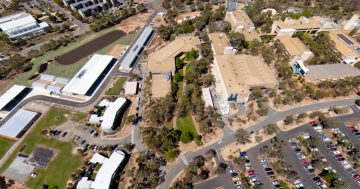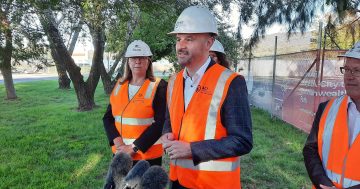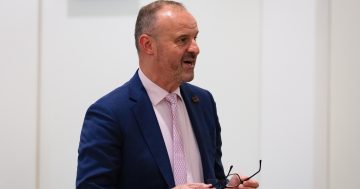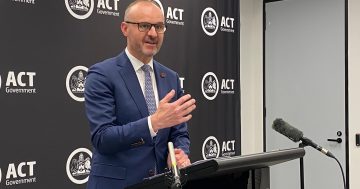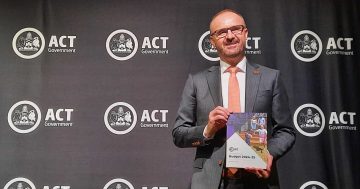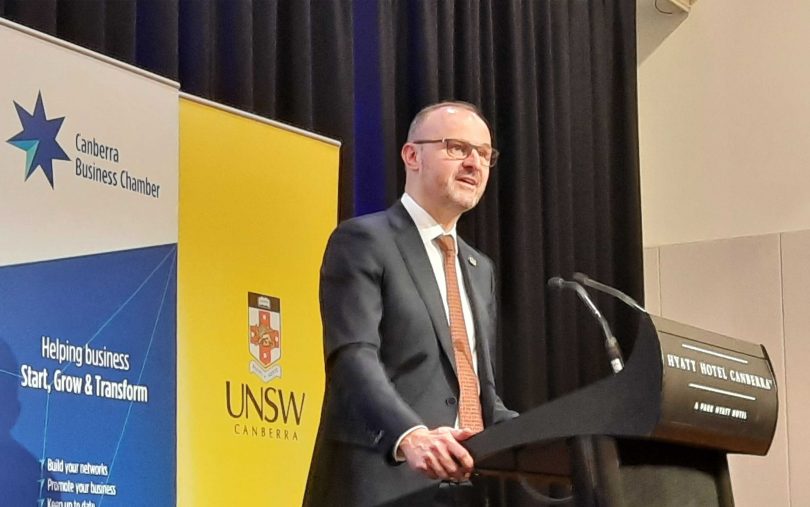
Chief Minister Andrew Barr at the Hyatt: “Governments should embrace reasonable risk in pursuit of recovery.” Photo: Ian Bushnell.
Chief Minister Andrew Barr has promised another big-spending Budget to support the Territory’s economic recovery from the impacts of the pandemic and create more jobs.
Mr Barr also told business leaders in his State of the Territory address today that the government would be doing all it could to attract skilled workers to the capital while overseas migration is on ice.
He said the 2021-22 ACT Budget, to be delivered on 31 August, would include record investments in the ACT’s public health and education systems, as well as public housing.
“The Reserve Bank of Australia has rightly urged the Commonwealth, state, and territory governments to boost public spending and accelerate job creation as we recover,” he said.
“Governments should embrace reasonable risk in pursuit of recovery.
“We should drive towards full employment by creating and shaping markets, strategic investments, delivering productivity-improving infrastructure, and essential public services.”
The government was still aiming to create 250,000 jobs by 2025 and pointed to sectors that need lots of workers or where Canberra has a competitive advantage, including space, cyber and renewable energy, healthcare, the arts and creative industries, and community services.
Mr Barr said the ACT economy was already strong, with economic activity in the year to date around 20 per cent above the decade average.
“On current trajectories, as measured in State Final Demand, the ACT economy is set to grow larger than the Tasmanian and Northern Territory economies combined over the next decade,” he said.
“We are the only Australian state or territory – and the only sub-national government in the Asia-Pacific region – that has retained our AAA credit rating.”
But finding enough skilled workers remained a challenge across multiple industries, and Mr Barr said these shortages would only get worse once the national economy bounces back.
He said there was an opportunity for the ACT in the number of people looking to leave the bigger cities searching for a higher quality of life, such as Canberra can offer.
But the ACT needed to do more to attract them in a fiercely competitive market, Mr Barr said.
He said the ACT Government would partner with the business community and universities to attract and retain Canberra’s workforce for the coming decade.
“We will work with industry sectors that are facing significant skill shortages – like hospitality, health, construction, and cybersecurity – to identify the barriers to attracting the workforce they need and develop sector-specific plans to address skill shortages,” he said.
“And we’re engaging with industry through the better regulation task force to make it even easier to do business here.”
Mr Barr said he had been devastated at the Commonwealth’s lack of support for universities during the pandemic.
The university sector was the ACT’s top export industry, and one in nine Canberrans either studied or worked at a university.
“Our universities are critical to our continued success – from providing the skills our city needs to conducting world-leading research, they cement our status as Australia’s knowledge capital,” Mr Barr said.
He pledged to keep working with the universities to get international and interstate students back on campus.












